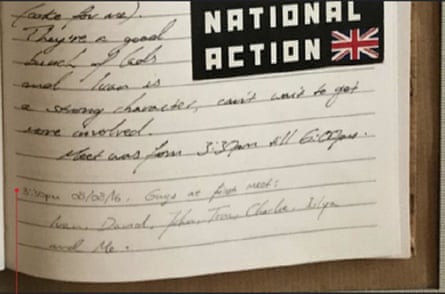A man has become the first serving British police officer to be convicted of a terrorism offence after he was found guilty of membership of a banned neo-Nazi group.
Ben Hannam had been working as a probationary officer for the Metropolitan police for nearly two years before his details were found on a leaked database of users of an extreme rightwing forum.
The 22-year-old was found guilty on Thursday at the Old Bailey in London of membership of the terrorism group National Action (NA), which was banned in December 2016.
He was also convicted of lying on his application and vetting forms to join the Met and of having terrorism material detailing knife combat and making explosive devices.

A ban on reporting the case was lifted after Hannam admitted possessing an indecent image of a child, which was to have been the subject of a separate trial.
The Met has insisted Hannam would never have been able to join the force had it known of his interest in the extreme rightwing and his previous membership of NA.
However, the case has put the Met’s vetting processes and the extent to which the force has kept pace with the evolution of the far right under spotlight. The force states online it “won’t accept applications from anyone who is, or has been, a member of the BNP or similar organisations”. The Met faces criticism for not asking Hannam’s school for a reference, something campaigners say would have flagged up concerns about his views.

Work to update the police vetting process has been underway independently of the case and amendments are due to be published by the College of Policing.
Hannam had signed up to the extreme rightwing forum Iron March when he joined the London branch of NA in March 2016. He wrote in a diary he had been “desperate to impress” an older NA organiser and his association with the group ended before he began working for the Met.
The Met identified Hannam may have been a member of NA during its investigations into details from the Iron March forum that had been leaked on to the internet. He was arrested at home, where the police found neo-Nazi posters, notes detailing his NA membership, as well as NA badges and business cards.
The ban on the NA in 2016 was the first time that a far-right group had been proscribed as a terrorist organisation by the home secretary and came after it had celebrated the murder of the Labour MP Jo Cox. NA members have included a 23-year-old who was jailed for life after pleading guilty to a plot to kill another MP, Rosie Cooper.

On his first Iron March post, Hannam admitted he was “completely swayed” by NA, whose ideology was described in court as being based on hatred of non-white groups.
He went on to try to recruit a new member via the forum, saying most NA members agreed that a “Hitler was right” slogan was “a bit too edgy”, but adding: “Then again it is pretty funny and we all know our stance on the big man.”
Hannam went on to attend the NA conference in Liverpool and went to boxing and graffiti events after NA was banned. But he insisted he had never been a member because he did not go to demonstrations or banner drops.
He applied to join the Met in July 2017, just days after he had spray painted the symbol for an NA alias, NS131, in a storm drain on the outskirts of Swindon, an act that was filmed for a promotional video.

Commander Richard Smith, the head of the Met’s counter-terrorism command, said it was a unique case and that there was no evidence Hannam had abused his position “to further his extremist views”.
“Once we identified his involvement with that organisation we took immediate steps to arrest him and put him before the court,” Smith said. “Obviously there will be some concerns from the public around the fact that a member of a proscribed group managed to become a member of the Metropolitan police service. But once we identified that fact we acted very robustly and swiftly.”
The case is also latest in which support for NA and far-right causes have come under scrutiny. Two days ago a 16-year-old was given a 12-month intensive referral order after pleading guilty to four counts of inviting support for NA.
Referring to Hannam, who told jurors he had been attracted to fascism at 16 and contacted NA after seeing propaganda online, Smith said: “Certainly it it would appear in this case that this young man was radicalised by material that was available online”

But the campaign group Hope not Hate said questions had to be asked about police vetting and how well the authorities were monitoring groups like NA.
“What is so concerning is how Hannam joined the police in the first place and managed to operate freely inside it without his involvement in far-right politics being known,” said the group, which counted Hannam as the 60th far-right activist or sympathiser to have been convicted of terrorism-related (or similarly violent) offences since early 2017.
“Given the changing nature of Britain’s far right, and it’s move to a post-organisational state, it seems incredible that the police only ask recruits about membership of the BNP. This is a failure which allowed a Nazi activist to join the force.”
Hannam, of Edmonton, north London, is suspended from duty. Checks found “nothing of concern” in his work at the Met and no complaints from colleagues or the public about his behaviour.
He has been released on conditional bail before sentencing on 23 April.
